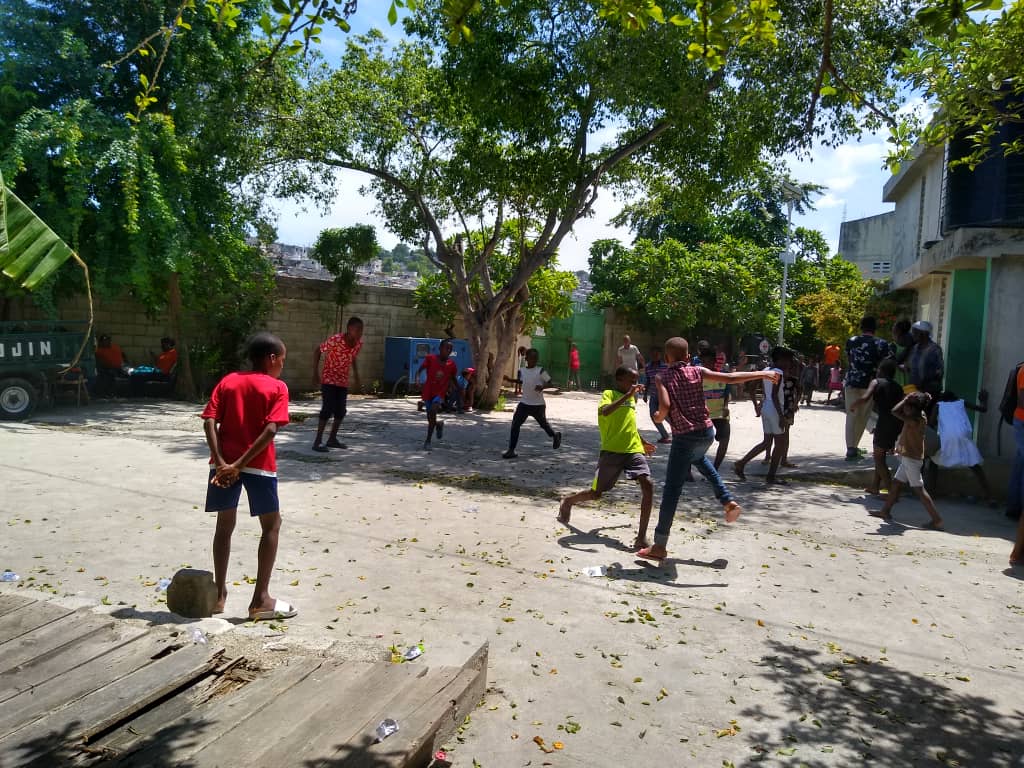This post is also available in: Kreyol
This post was originally written in Kreyòl.
Roselaine Pierre Gregoire is 49 years old. She lost her home where she lived for 20 years after the armed gang named G9 led by Jimmy Cherizier attacked the neighborhood of Belair. Roselaine is grateful that she was able to save her two children, one boy and one girl. “We escaped under gunfire, it is because of God that we are still alive. So many people who are here with us at this encampment lost their families. I don’t think I’ll ever be able to forget that day. My children have witnessed too much bloodshed.”
My children have witnessed too much bloodshed.
On the afternoon of August 31st, the G9 gang attacked the neighborhood of Belair. Many people died, houses were burned, and hundreds of families fled their homes. Jimmy Cherizier, who is a former police officer, has already been accused of multiple massacres in the recent past, especially in La Saline and Grand Ravine which cost the lives of dozens of people. Cherizier, who currently has a warrant out for his arrest, and his gang used to operate in silence during the former police chief Michel Gedeon’s tenure. However, this has changed. Jimmy Cherizier was recently seen participating in food distributions alongside police officers in his neighborhood in Delmas 6 in the beginning of the pandemic.
During an explosive radio interview on Radio Magik9, earlier this month, one of the most influential members of President Jovenel Moise’s commission for disarmament (known as the CNDDR), Jean Rebel Dorcénat, stated that it was his idea for several gang leaders to join together to form a federation, which has now become the gang named G9. He later walked back the statement, and clarified to say that he was not responsible for creating the G9, but he did, however, advise gang leaders to form an alliance in order to make the disarmament commission’s job easier.
Olrich Jean Pierre, an anti government corruption activist shared his understanding of the situation, “No one should be shocked about the resurgence of violence in the last few months. We are used to PHTK’s tactics. Whenever a movement seems to be starting, the violence resurges. Today it is more dire because the government has used the federation of gangs to create panic, and to stop people from mobilizing. All of this violence is because those in power do not want protests to start after the publishing of the latest PetroCaribe report that clearly shows the ways many leaders in the PHTK government wasted these funds. This is why these groups of gangs are attacking working-class neighborhoods, where most mobilizing happens.

There are more than 500 people who have relocated from Belair to the soccer field, Teren Pè Espiriten, located in the neighborhood of Solino. People are sheltering under tents and tarps. Many of them have lost everything they owned in the fires that were set ablaze in their neighborhoods.
“I lost my house, which is all that I owned. Today, people help me find food to eat and clothes to wear so that I can survive each day. I do not have the words to explain how angry I am. I have lived on Mayard Road since 1985, and this is the second time I had to flee and leave my house. The first time was when it was damaged during the earthquake of January 12th, 2010. Today, it is gangs that are spreading terror. We are asking for justice and reparations because we can’t continue like this in the middle of a pandemic.” Phalange Alexis, one of the victims living in temporary shelter at Teren Pè Esperiten in Solino.
During a press conference broadcasted from the National Palace on July 18th, 2020, President Jovenel rejected the accusations that suggest that he and his government are in control of the gangs. “Me? A guy from Troup du Nord who was working in Port de Paix, you think I have control over gangs in the capital? You think I was able to make all these kinds of friends in Port-au-Prince that quickly? Me? The guy who used to play soccer around town in Port-de-Paix?” He asked, incredulously. The president went on to add “…I’ll say this, [the gangs] are made up of Haitians. So, it’s not a problem if everyone calls them my friends. That is why I created the CNDDR (the disarmament commission), the role of the CNDDR is to go and create a dialogue with everyone… Today, the state should have the monopoly over violence. Violence should not be in the hands of anyone else. That is the role of the police, that is the role of the justice department, and that of the Haitian army that is slowly rebuilding…”
Haiti is still under the threat of Covid-19 which continues to wreak havoc around the world. While it is true, as of now, the pandemic has not created the impact that was predicted for Haiti, but the pandemic is not over yet. Haiti continues to report about 40 cases per day, and people continue to die.
Despite the acts of violence that continue to affect the population, major international organizations such as Amnesty International, Human Rights Watch, and the United Nations Human Rights Council have yet to condemn these acts. This behavior goes against their stated missions. Jovenel Moise still enjoys the support of the Core Group, which is an assembly of nations such as the United States, France, the European Union, and BINUH. Core Group continues to support this government despite the accusations of crimes, continued corruption with impunity, and Core Group has publicly supported Jovenel Moise’s plan to change the constitution and organize elections.
Pierre Esperance, the executive director of RNDDH, a leading human rights organization in Haiti that published a report on gang activity as a political weapon a few months ago, offered the following remarks on the situation: “I consider Jean Rebel Dorcenat as an ally of the G9 Gang. His declaration supporting the alliance between these gangs is not new. Since the month of June, he has been going around every radio station to say the same thing. The worst part is that the international community continues to support a government that is in bed with gangs and is responsible for nine massacres in the country. I have not seen anything like it since the departure of Jean Claude Duvalier.”
